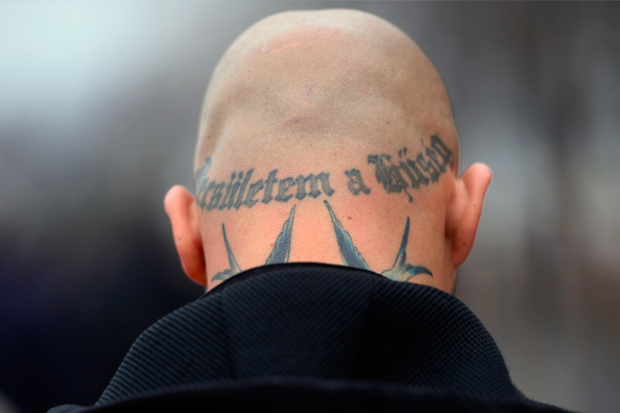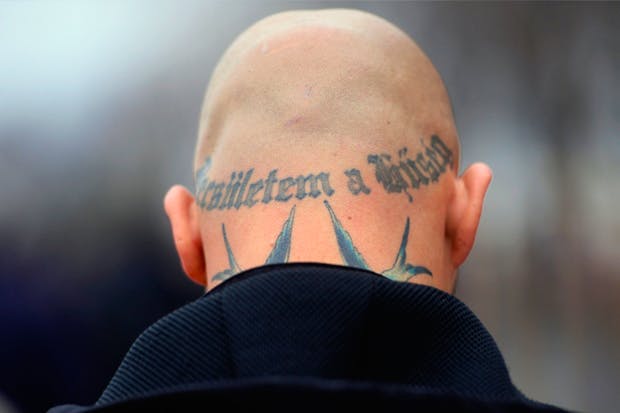It is, perhaps, a poor reflection of our times when a historian feels compelled to remind others that the Nazis were evil. But here we are.
Trump’s victory in the United States presidential election has emboldened a caricature of everything awful the Left believes about the Right. The media is euphemistically calling this movement the alt-right, but they are far worse than mere anti-establishment Trump allies.
The term ‘alt-right’ was coined by the movement’s de-facto leader, Richard Spencer, head of the National Policy Institute in Washington, D.C.. Spencer and his organisation are open about their dedication ‘to the heritage, identity, and future of people of European descent in the United States’. It is essential from the start that we do not ignore what these people represent.
Spencer and the so-called alt-right are far from conservative. It is difficult to reconcile his positions with any political tradition to the right of centre. The alt-right is against the free market and cares little for the constitution. Spencer opposes individualism and supports a version of the European Union, but has also expressed admiration towards the Soviet Union for protecting Russians against Western liberal democracy. He has refused to call Adolf Hitler evil, and would not condemn the Ku Klux Klan when asked. He claims to be a ‘cultural Christian’, and is pro-abortion insofar as abortion might reduce minority births.
He is a radical white nationalist, a revolutionary who explicitly committed himself to the creation of a white ethno-state, and a ‘peaceful ethnic cleansing’. Spencer and members of the National Policy Institute were recently captured on video giving the Nazi salute and shouting ‘Hail Trump! Hail our people! Hail victory!’ at a post-election celebratory conference in Washington DC. It takes a particularly dull kind of partisanship to continue denying the alignment of the alt-right with neo-Nazism.
All right-thinking individuals should denounce neo-Nazi and other white supremacist radicals hoping to co-opt disenchantment with the political establishment. This is not up for debate; they are Nazis. No-one with a modicum of historical education would humour them.
Not until now, at least.
Since the election, major media outlets have been profiling Spencer and his followers with a fascination easy to mistake for normalisation. They are cast as urbane and stylish, the fresh, dapper face of twenty-first century white power. Historians of the Third Reich have reeled back in horror at this particular lapse in historical memory, reminding us Hitler’s Nazis, too, wore fashionable uniforms, and back then they were designed by Hugo Boss.
It is concerning that the likes of Spencer and the alt-right – though they may be small in number – are getting a free run in the international media. What is also worrisome is that many otherwise sensible conservatives have so far failed to distance the movement from themselves.
But they should. The so-called alt-right are in thrall to an ideology thousands fought and died to protect us from – do we not remember their sacrifice? We should not need historians to remind us of this, and to simply ignore a neo-Nazi group receiving this much mainstream attention is hubris of a deplorable kind.
With an impotent Left seemingly more interested in enforcing politeness among its own ranks, however, and prominent voices on the right reluctant or slow to denounce radicals in their midst, there seems little to stop hateful organisations flourishing in other parts of the world, including Australia. Perhaps historians of Nazi Germany have not made their message clear enough, but I doubt it.
For us, all the way across the Pacific, it is easy to meet such concerns with apathy, even amusement. We are all loathe to admit it, but since the postwar era Australians have often taken their lead from the Americans. The Left and Right in Australia have borrowed freely from the cultural politics of the United States, often without regard to the disparate material conditions and historical circumstances of our two nations.
At least one trend, which thrives rather than falters in the face of social diversity and difference, has reproduced itself faithfully: the ascendancy of hyper-competitive individualism and its accompanying identity politics.
An outcome of this – lost among commentaries on the excesses of liberal undergraduate ‘idpol’ (identity politics) – has been the emergence of a class of young, lonely, directionless men who are angry at the world for reasons they struggle to articulate, and who feel the world is angry at them for simply existing. The sense of community and purpose provided by radical fringe groups in the absence of better options is, for some, an irresistible temptation.
History teaches us this much.
Australia already has numerous self-identifying neo-Nazi, skinhead, white nationalist, and fascist organisations. They draw sustenance from the iconography and history of a Nazi Germany filtered through American white supremacism and re-deployed for modern Australia. They are not as well-dressed or well-spoken as Spencer & Co., but they are crafted from the same repulsive ideology. And they, too, have been emboldened by the Trump story, and by the re-emergence of a local anti-establishment political force in Pauline Hanson’s One Nation.
We must do more for the people, especially young men, who we may otherwise lose to extremist communities, and it should not be up to the Left alone to condemn these radicals. If the party of Menzies wishes to do justice to his memory, it would do well to remember he was not the fascist-appeaser of popular historical myth, but a committed democrat appalled by the evil of Nazism and not afraid to say as much.
Accept, if you will, the anti-establishment sentiment Trump represents – there is much to be disenchanted about – but do not accept fringe-dwelling parasites attempting to drag mainstream conservatives into their rotten world.
The moment it becomes controversial to condemn Nazis wherever we find them is the same moment we will know something has gone terribly wrong.
The post Our grandads didn’t die for this appeared first on The Spectator.
Got something to add? Join the discussion and comment below.
Get 10 issues for just $10
Subscribe to The Spectator Australia today for the next 10 magazine issues, plus full online access, for just $10.














Comments
Don't miss out
Join the conversation with other Spectator Australia readers. Subscribe to leave a comment.
SUBSCRIBEAlready a subscriber? Log in